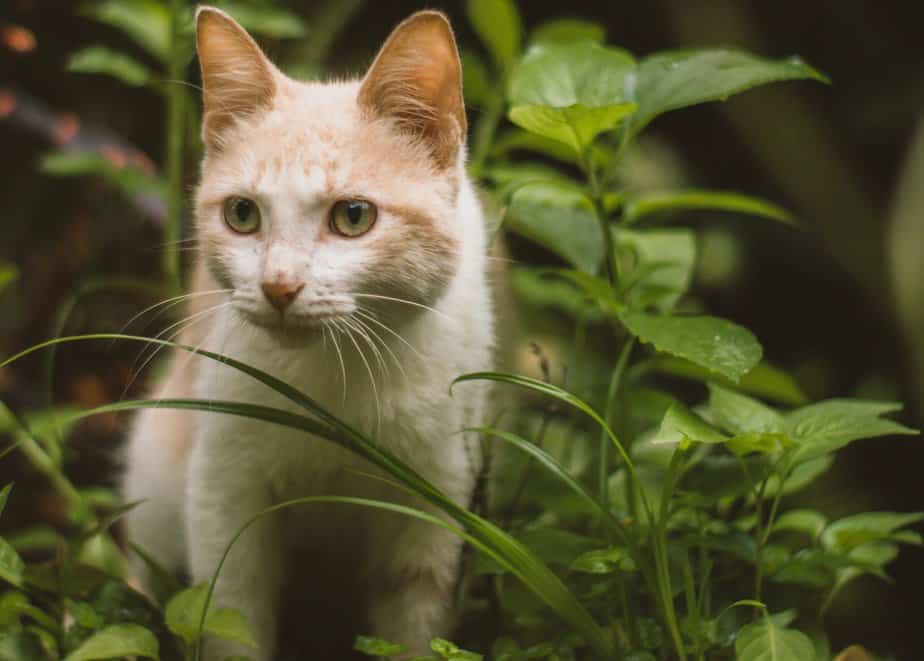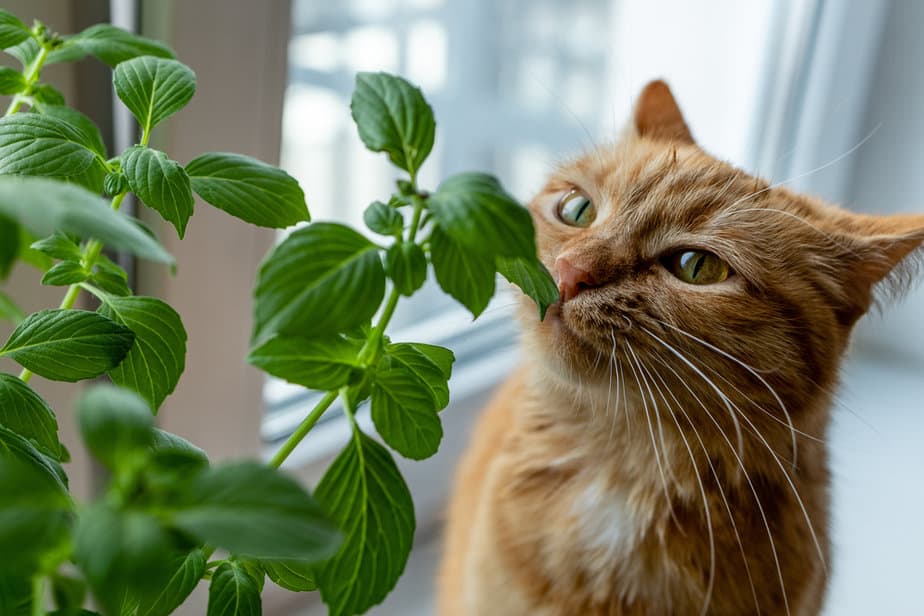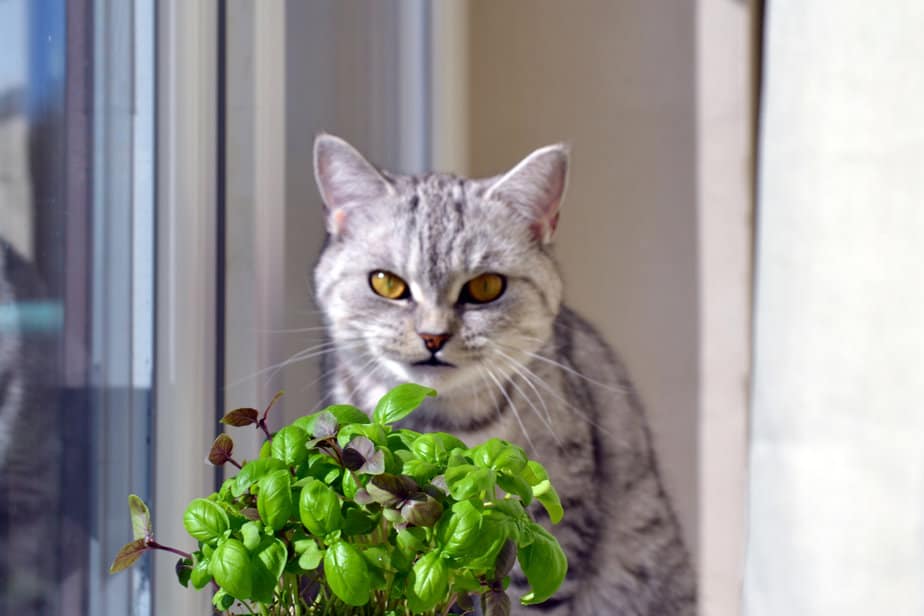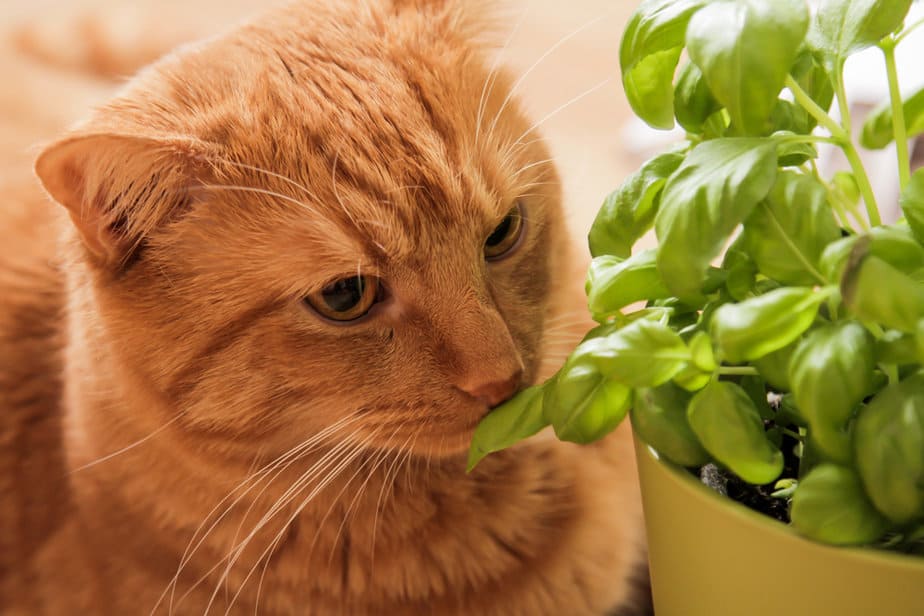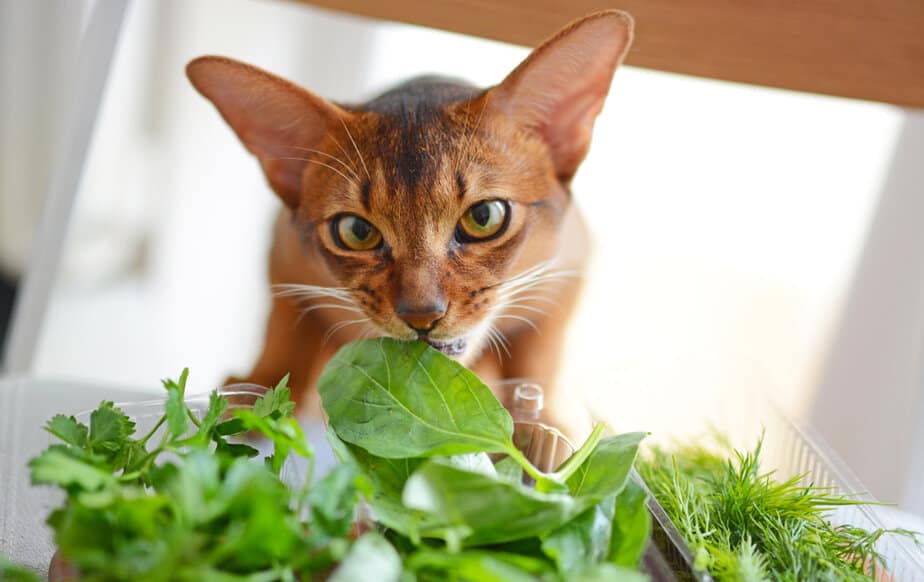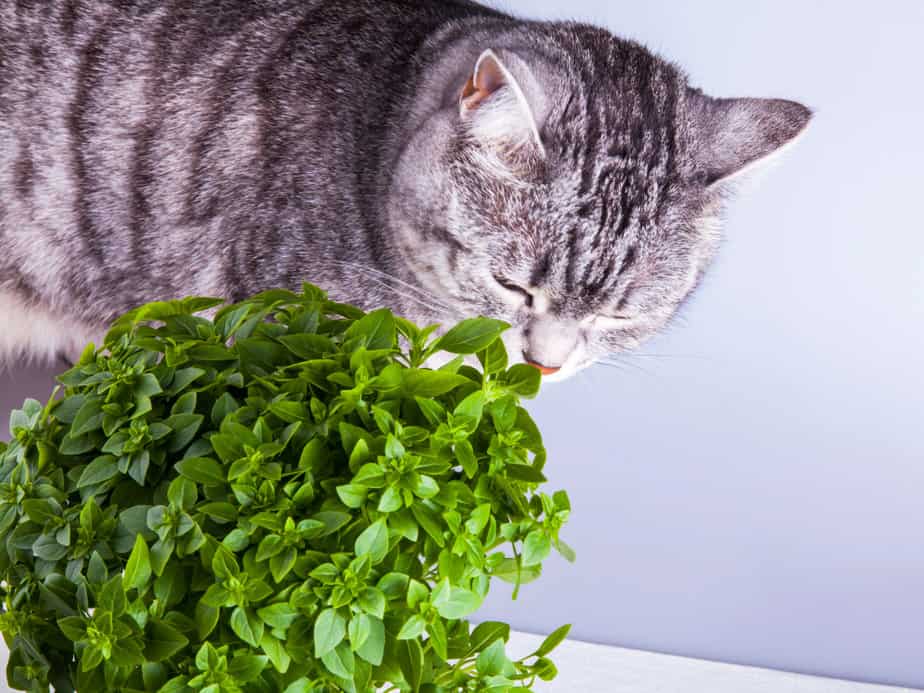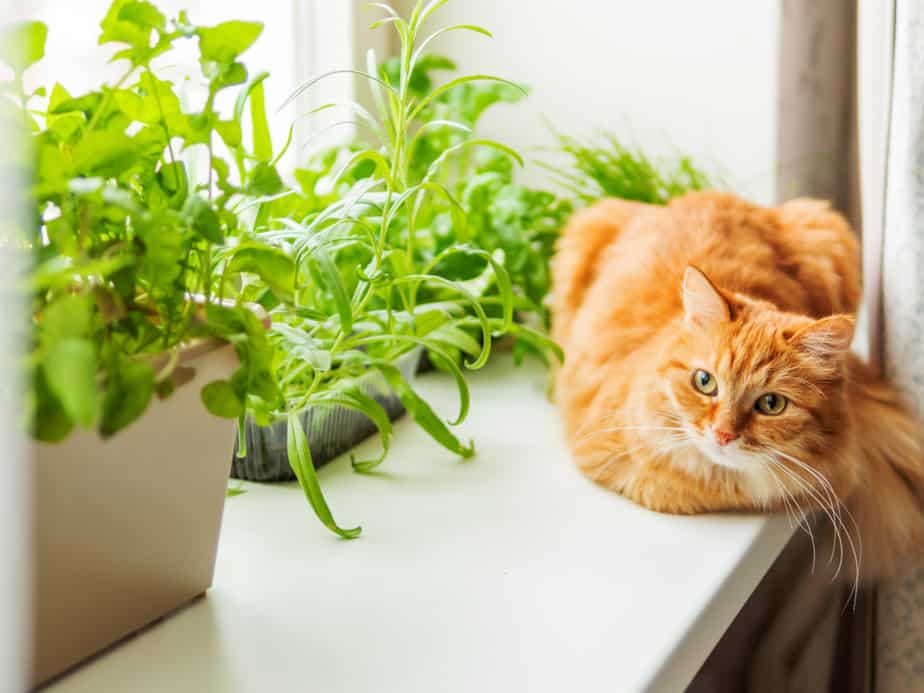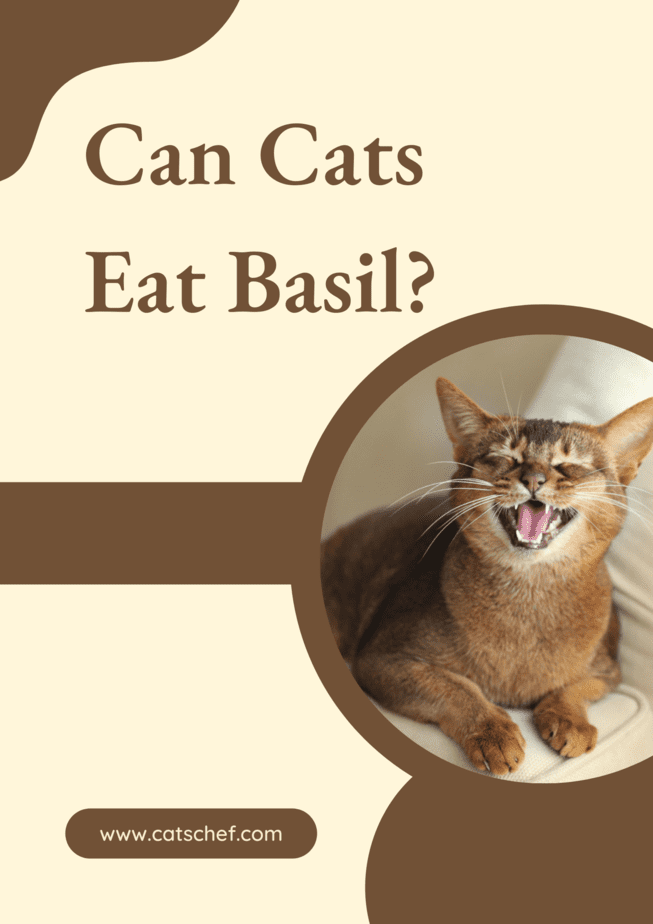📖 Table of Content:
Argh, the moment you and your precious purrincess decided to throw a pizza party a thought crossed your mind. “Can cats eat basil?!” Who wants to munch on bread with some tomato sauce and cheese? Who wants to munch on a sorry excuse for a pizza without the mouth-watering basil aroma?
We’ve scoured the internet for you and here’s what we found out. Believe it or not, basil’s the least of your concerns when it comes to sharing a paw-licking slice of pizza with your four-legged friend.
According to our friend over at the ASPCA (American Society for the Prevention of Cruelty to Animals), cats can eat basil. This aromatic herb contains a bunch of fiber, vitamins, minerals, and antioxidants that can benefit your cat’s health without causing her a bunch of digestive problems.
“Hmm, has my furry friend become a vegetarian overnight?” Don’t worry, that’s not the reason why she’s suddenly spending her free time exploring your herb garden. She’s probably curious about what you’ve been munching on for the past several weeks and she wants to feel included.
Actually, cats are notorious for chewing on grass whenever they can get their paws on a delicious sample (they’re quite picky when they’re choosing what goes into their stomachs).
Even wild cats take a couple of handfuls (pawfuls?) every now and then to cleanse their palettes and offer a helping hand to their digestive systems. But, can cats eat basil when they’re looking for a quick pick-me-up after a long day of meowing and purring?
What’s basil?
Oh, basil, who wouldn’t love you when you go so well with everything?! Basil is an Italian herb that belongs to the mint family. This aromatic herb’s one of the most popular among humans because of the fresh aroma and peppery flavor.
Basil can be used dried and fresh and can be added to drinks, soups, sweet and savory dishes, and pretty much everything else you’ve got on your mind. And, most importantly, basil brings a bunch of nutritional and health benefits to the table.
Fiber, vitamins, minerals, and antioxidants ensure the health of the immune system, help lower blood pressure, reduce cholesterol and triglycerides, and improve blood flow. Basil leaves have anti-inflammatory and anti-bacterial properties, support liver function, and detoxify the body.
But, these incredible benefits only work for humans. While cats can reap some of the basil’s benefits, they have different nutritional and health needs from humans. Don’t get me wrong, basil’s great for cats… just not in the same way.
“So, my feline friend can eat basil with no repercussions?” Cats can eat basil with no repercussions most of the time. While basil doesn’t contain pretty much anything that could negatively affect your cat’s health, you can’t forget that not every cat’s digestive system works the same way.
So, before you and your cat rush to the nearest Trader Joe’s to buy a month’s worth of basil (for only $2.99 a pack?!), take a breather and give your vet a visit. Who’s to say your cat isn’t allergic to basil or isn’t going to experience digestive problems after a leaf or two?
So, can cats eat basil?
Cats can eat basil. You have nothing to worry about on the off chance that your cat decides she’s bored with her regular Meow Mix and she’s on the market for something a bit more green and leafy. She’s going to be just fine as long as she doesn’t scoff down your entire herb garden.
But, there’s always a but when cats decide to eat something that isn’t supposed to be a regular part of their diet. Cats are carnivores which means they require heaps of meat, animal protein, and animal-sourced nutrients in their diets.
They don’t necessarily require fruits, veggies, and herbs the same way humans do. Their digestive systems don’t even possess the enzymes necessary to break down and process most foods humans eat on a regular.
That’s not to say that cats can’t eat anything other than meat, of course. Wild cats get most of their nutrients from other animals, the content of their stomachs, and wild plants. House cats get (or at least they should get) most of their nutrients from carefully crafted cat food and cat kibble.
But, we can’t forget about the 10% of every cat’s diet that’s reserved for treats and other miscellaneous morsels. Whenever your notice your cat’s becoming a fan of something she shouldn’t eat, you can let her have an occasional treat.
Make sure it isn’t something that’s going to cause her harm and you’re good to go! Actually, this is where basil comes to play. While it shouldn’t be a regular part of your cat’s diet, there’s no reason why you shouldn’t throw it into her regular meals from time to time. Spice things up a bit, you know?
What’s good about basil?
How about everything?! Basil’s one of those herbs that can make your cat happy and healthy in a matter of minutes. When you’re wondering whether cats can eat basil, look at the number of nutrients basil brings to the table. Wonder no more, right?
Basil contains a bunch of fiber, vitamins, minerals, and antioxidants that can improve your cat’s immune system, maintain the health of her digestive system, and ensure the proper function of her nervous system. “Basil seems to cover every base and every system. How’s that possible?”
1. Vitamins and minerals
Starting with a bang, let’s talk about the ever-so-delicious vitamins and minerals your four-legged friend can get from basil. Basil’s a great source of vitamin C, vitamin A, vitamin K, calcium, iron, folate, and magnesium.
Cats can eat basil, so your furry friend can reap these benefits from an occasional basil leaf. We can’t forget to mention that cats should get most of their nutrients from other animals. But, getting them from plants (occasionally!) should be overlooked.
Let’s take a closer look at some of the benefits, why don’t we! Vitamin C can boost your cat’s immune system, help the production of collagen, and ensure the health of her muscles and bones. Vitamin A ensures your cat’s healthy skin and hair (Beyonce? More like Catyonce, right?!).
And, as far as minerals go… Calcium’s responsible for the health of your cat’s teeth and bones. Iron’s in charge of treating iron deficiency anemia and maintaining the health of your cat’s red blood cells. And magnesium’s in control of your cat’s hormones (and mood swings, of course!).
2. Antioxidants
Here’s the thing, cats can get most of the basil’s vitamins and minerals from cat food and cat treats. Cats can also get most of the essential vitamins and minerals from other animals. But, they can’t really get their paws on antioxidants the same way.
That’s where basil comes to play. It is packed with antioxidants such as vitamin C and betacarotene. Antioxidants are essential for your cat’s health because they support the health of her immune system, fight against bacteria, parasites, and free radicals, and minimize damage to their cells.
3. Fiber
And we can’t forget about fiber, one of the most important things cats can get from plants. Fiber provides bulk to help food move through your cat’s digestive tract. Fiber also retains water which, in turn, helps with constipation and diarrhea. Fiber’s overall a great tool for your cat’s digestive system!
And, there’s plenty of fiber in basil. Just a couple of munches of basil can provide your cat with staggering 1,6 grams of fiber (and make her say goodbye to uncomfortable litterbox escapades!).
What’s bad about basil?
Don’t worry, this list isn’t going to be half as long as the other one! There’s pretty much nothing wrong with feeding basil to your furry friend on occasion (our friends at the ASPCA agree). But, there’s a thing or two to consider before you venture out on your third Trader Joe’s trip of the week.
First things first, make sure your cat doesn’t experience an allergic reaction after munching on a couple of basil leaves. Unfortunately, cats can be allergic to basil and can experience anything ranging from rashes, irritation, and weakness, to vomiting and diarrhea.
On the other hand, we can’t forget about the fact that basil contains a compound that can affect your cat’s blood clotting ability (which can become pretty unfortunate on the off chance she gets hurt in the meantime).
Last but not least, consuming excessive amounts of basil can cause a bunch of digestive problems, diarrhea, and vomiting. Make sure to consult with your vet before making any significant changes to your cat’s diet (and before treating your cat to a slice of Domino’s pizza!).
What’s the deal with basil and catnip?
“Cats can eat basil and cats can certainly eat catnip, so… Are basil and catnip one and the same!?” They’re not, but we’re here to explain where the confusion comes from. Most pet parents believe there’s some sort of a connection between basil and catnip because they’re quite similar.
Both of these herbs have a distinctive scent that’s attractive to cats. Most cats adore sniffing, nibbling on, and pawing at catnip because catnip contains something called nepetalactone (and no, we didn’t just cast a spell at your cat!).
Nepetalactone’s what’s responsible for your cat’s odd behavior whenever she finds herself in the same room with this aromatic herb. Some cats have the same reaction to basil (and considering that basil and catnip come from the same family), pet parents assume these two herbs are one and the same.
Basil does have a distinctive scent that acts as a cat attractant, but basil doesn’t contain ANY nepetalactone. These two herbs might be connected through their cat attractant properties, but basil gives rise to a pretty mild reaction.
What other herbs can cats eat?
We’re talking about A BUNCH of other herbs! But, before we start that conversation we can’t forget about the herbs your cat shouldn’t eat. Lemongrass, tarragon, oregano, and mint represent this group and your cat shouldn’t even catch a whiff of them (yes, they’re THAT toxic!).
Other than that, feel free to surprise your furry friend with a nibble of parsley, thyme, cilantro, dill, rosemary, catmint, and catnip. These herbs contain a bunch of fiber, vitamins, minerals, and antioxidants that can do wonders for your cat’s health.
And, according to ASPCA, these herbs don’t contain anything that could affect your cat’s health in a negative manner. That’s not to say the two of you should go overboard and throw yourselves a vegetarian party. But, feel free to enjoy a couple of leaves here and there.
Can cats eat basil? What’s the conclusion?
Yes, cats can eat basil! Consuming basil from time to time offers your furry friend a bunch of nutritional and health benefits.
Basil’s packed with fiber, vitamins, minerals, and antioxidants which can boost your cat’s immune system, maintain the health of her digestive system and ensure the proper function of her nervous system.
Basil’s pretty much the GOAT among the cat-friendly herbs because of the strong scent that acts as a cat attractant. Your cat won’t enjoy munching on basil the same way she would enjoy munching on catnip (that’s for sure), but that’s not to say that she won’t reap the benefits.
Grab your cat and head to the nearest Whole Foods, Trader Joe’s, or even your favorite farmers’ market. You two can stock up on basil and enjoy everything this herb has to offer.
